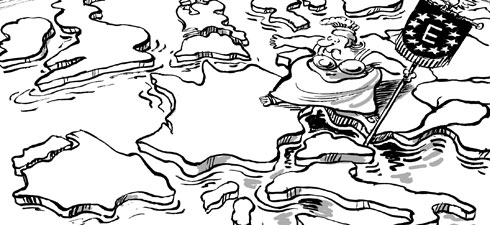Thierry Baudet makes controversial claims in his book, and in his article in the NRC Handelsblad of last week. But he is right about one thing, which is that the project of European integration was founded on the belief that nationhood and national self-determination were the prime causes of the wars that had ruined Europe.
As a result of this founding belief European integration was conceived in one-dimensional terms, as a process of ever-increasing unity, under a centralised structure of command. Each increase in central power was to be matched by a diminution of national power.
In other words, the political process in Europe was to be endowed with a direction. It is not a direction that the people of Europe have chosen, and every time they are given the chance to vote they reject it – hence everything is done to ensure that they never have the chance to vote. The process moves always towards centralisation, top-down control, dictatorship by unelected bureaucrats and judges, cancellation of laws passed by elected parliaments, constitutional treaties framed without any input whatsoever from the people, and a currency imposed from above and with no clear decision as to who bears the burden of the debts associated with it.
Loyalties take a national form
The process is moving always towards imperial government, making very clear that the opposite of nationhood is not Enlightenment but Empire. And only one thing stands opposed to this result, and that is the national sentiments of the European people.
As an Englishman and a lover of the civilisation of Rome I am not opposed to Empire. But it is important to recognise what it involves and to distinguish the good from the bad forms of it. In my view the good forms serve to protect local loyalties and customs under a canopy of civilisation and law; the bad forms try to extinguish local customs and rival loyalties and to replace them by a lawless and centralised power.
The European Union has elements of both arrangements: but it suffers from one overwhelming defect, which is that it has never persuaded the people of Europe to accept it. Europe is, and in my view has ever been, a civilisation of nation states, founded on a specific kind of pre-political allegiance, which is the allegiance that puts territory and custom first and religion and dynasty second in the order of government.
Give them a voice, therefore, and the people of Europe will express their loyalties in those terms. In so far as they have unconditional loyalties – loyalties that are a matter of identity rather than agreement – they take a national form.
The political class in Europe does not like this, and as a result has demonised the direct expression of national sentiments. Speak up for Jeanne d’Arc and le pays réel, for the "sceptred isle" and St George, for Lemmenkäinen’s gloomy forests and the "true Finns" who roam in them, or even for Henk and Ilsa, and you will be called a fascist, a racist and an extremist.
National loyalty has nothing to do with racism
There is a liturgy of denunciation here that is repeated all across Europe by a political class that affects to despise ordinary loyalties while surreptitiously depending on them. The fact is that national sentiment is, for most ordinary Europeans, the only publicly available and publicly shared motive that will justify sacrifice in the common cause – the only source of obligation in the public sphere that is not a matter of what can be bought and sold.
In so far as people do not vote to line their own pockets, it is because they also vote to protect a shared identity from the predations of those who do not belong to it, and who are attempting to pillage an inheritance to which they are not entitled. National loyalty has nothing intrinsically to do with racism or fascism: its primary expression is in the attachment to territory and to the community that has grown in it.
If the present crisis has convinced us of nothing else, it has surely brought home to us that when the chips are down politicians both demand sacrifice and expect to receive it. But how can you have sacrifice if you do not have belonging, and how can you have belonging if you do not have borders that distinguish "ours" from "theirs"? We should be grateful to Thierry Baudet for raising these questions, and for opening a debate that we need in Britain just as much as you need it in Holland, and just as much as it is needed by all the other European nations.
Was this article useful? If so we are delighted!
It is freely available because we believe that the right to free and independent information is essential for democracy. But this right is not guaranteed forever, and independence comes at a cost. We need your support in order to continue publishing independent, multilingual news for all Europeans.
Discover our subscription offers and their exclusive benefits and become a member of our community now!












